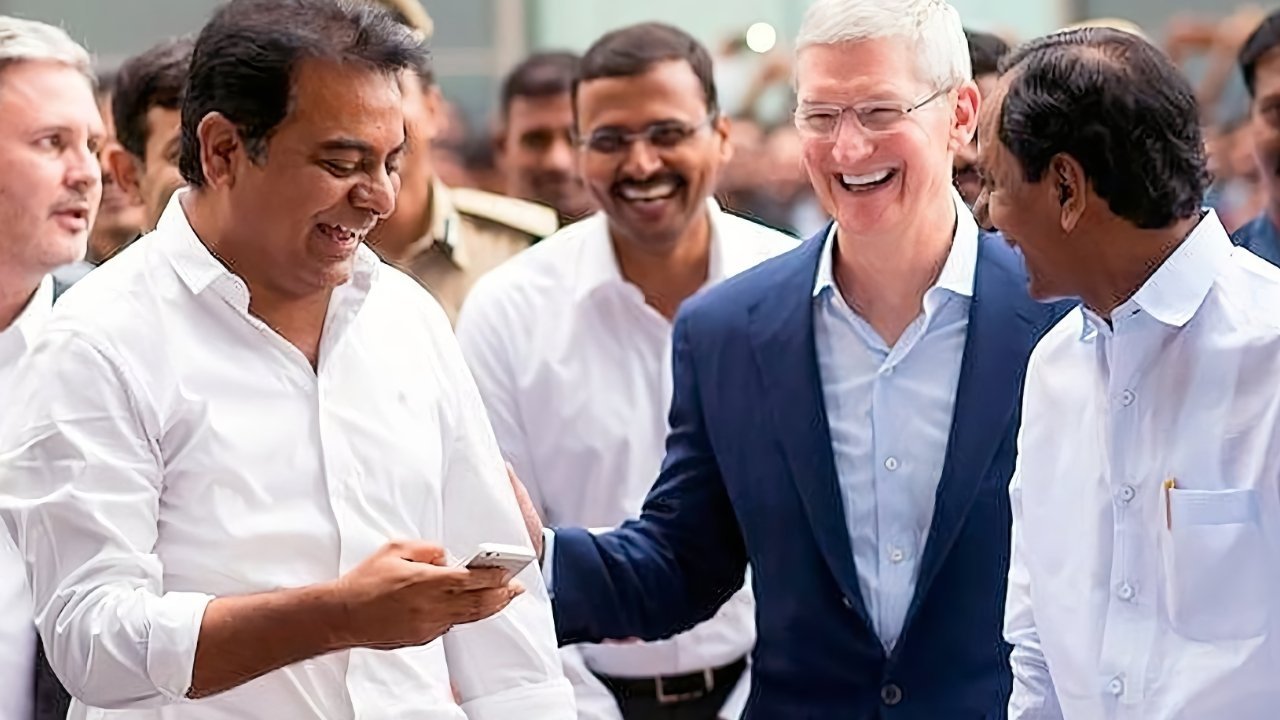Apple ramping up India manufacturing expansion to avoid Trump tariffs on China
Indian media has revealed that Apple is in talks with more than 40 firms in the region to become component suppliers for devices including the iPhone, ahead of a Trump administration applying tariffs to Chinese imports.

Tim Cook in a previous visit to India -- image credit: Apple
Tariffs that are notionally applied to a country are paid by the US firm importing the goods. Consequently any China tariff would raise the cost to Apple of importing iPhones, and consequently the price of iPhones would increase steeply.
According to Indian publication MoneyControl, however, Apple is working to circumvent the issue by replacing China with more suppliers within India. Apple is reportedly in talks with over 40 suppliers, ranging from major technology firms and large conglomerates, to IT companies and electronics manufacturing service (EMS) providers.
"The activity is on for some time at a larger level. Apple has a big team that has been discussing with Indian companies, including large conglomerates," an unspecified source told the publication. "They have met all large EMS companies in India, including Dixon and Amber. They are also talking to some global players."
A second source claimed that Apple is working to shortlist its prospective suppliers. "Apple is evaluating which component can be sourced from which Indian company if it inducts them as partners,"said the source.
"Although it will take some time," continued the source, adding that "for instance, Aequs group took almost two years to move to the trial stage to be onboarded as an Apple supplier for MacBook enclosures and mechanical components for the Apple Watch."
As well as the expected escalation in US/China tensions, Apple is said to be working with Indian companies because of expected local incentives. A third source said Apple was also planning joint ventures with firms from Taiwan, Japan, South Korea and more.
"It is, however, difficult to shift to non-Chinese suppliers for Apple," said the source. "[Until] 2020, everything that Apple was manufacturing was being done in China, including most parts of sourcing of components."
"Apple is [now] taking proactive steps ahead of the upcoming electronics components incentive scheme to enable Indian companies to onboard technology partners from other countries and swiftly benefit from the initiative," he or she continued.
There has also been increasing tension between India and China. This saw India denying Chinese firms permission to establish facilities in the country, including iPad manufacturer BYD.
"Apple's Chinese partners are not keen on coming to India due to existing cases against other Chinese companies in the electronics space. There are visa issues as well," the third source continued.
The expansion of its supply chain in India is far from a sudden move. Apple and other technology firms have been working to lessen their over-reliance on China for many years.
As a result, by January 2024, Apple suppliers had spent $16 billion in their move away from China. While countries such as Vietnam have benefited, the expansion in India has made Apple the fastest-growing firm in that country for the last 50 years.
Read on AppleInsider

Comments
What's really too sad is that Apple hasn't yet adopted and perfected automated assembly.
Imagine small automated assembly plants in each major market able to adapt to any new instructions given to them. Raw materials move in one end, and assembled products out the other.
No more long-distance (polluting) shipping, as products are assembled in real-time as demand ramps up in each market. No more cross-border shipping, and the ability to customize manufacturing for each region independently.
Now imagine that being applied at the point-of-sale. Want a new iPhone 20? Press a button and it's built for you right there, on the spot. Zero waste.
To top it all of .. a hall of robots in the US won't bring any manufacturing jobs back. Maybe some overseers so you could put this in some southern states, they are used to oversee slave labor.